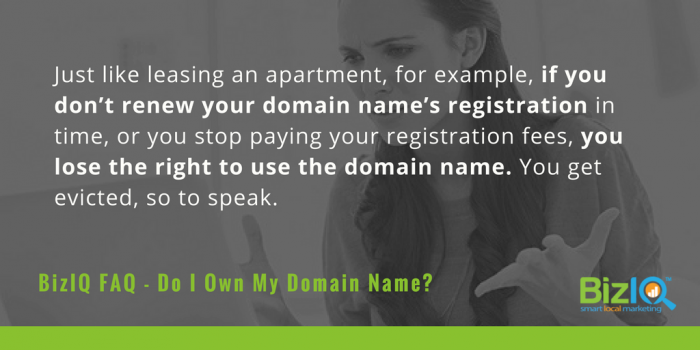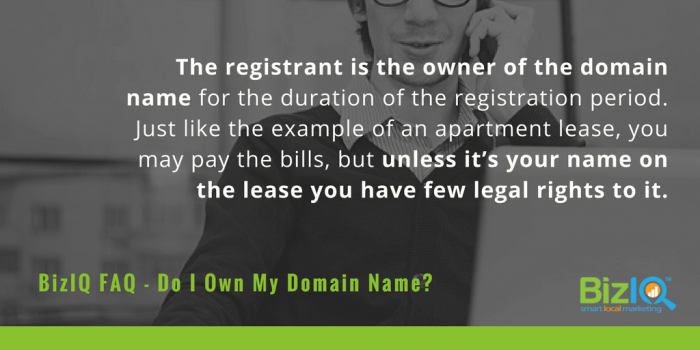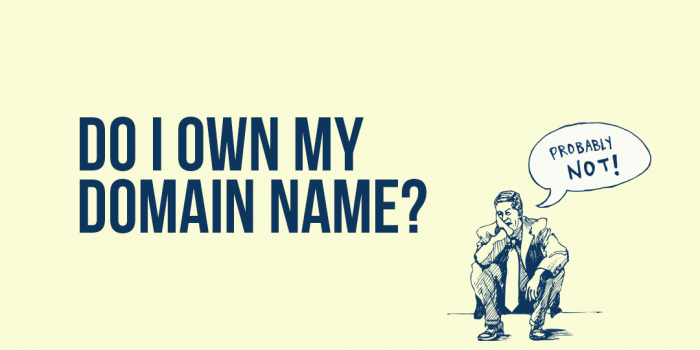Picture this:
Jane Doe from Jane’s Flower Shop calls her project manager here at BizIQ, and she is clearly alarmed. After a disappointing experience with her brother’s friend who is a “web guy” about a year ago, her website janesflowershop.com disappeared from search engine rankings. She’s lost a lot of business because of the drop in rankings, and to top it off, her old website isn’t even live anymore. Jane was excited to get her new website launched, but now it seems that janesflowershop.com isn’t available to use anymore.
Cue the outrage.
How can that be? Jane’s business is called Jane’s Flower Shop. How can someone else just steal that name right out from under her? Should she call the police? A lawyer maybe? She paid for that domain name. She owns it, right?
Not really.
While we can definitely understand the frustration, sadly this situation is not uncommon. It may come down to simple semantics and a few frequent misconceptions about how domain names work. Let’s talk about the two most common scenarios we encounter.
You Don’t Own Your Domain Name, Even if You Paid For It
We’ll start by defining an important piece of internet marketing jargon:
Registrar: A domain name registrar is an organization or commercial entity that manages the reservation if Internet domain names. A domain name registrant pays a recurring fee to the registrar in exchange for use of the domain name for a defined period of time.
 You see, “buying a domain name” just isn’t an accurate statement. Neither is “owning” a domain name. Leasing a domain name would be a much more appropriate term. Just like leasing an apartment, for example, if you don’t renew your domain name’s registration in time, or you stop paying your registration fees, you lose the right to use the domain name. You get evicted, so to speak, and eventually, someone else might choose to move in. Once someone “moves in” on your domain name, you might be out of luck even if the domain name in question is yourbusinessname.com or, as John Malkovich complained in a recent super bowl commercial, your own name.
You see, “buying a domain name” just isn’t an accurate statement. Neither is “owning” a domain name. Leasing a domain name would be a much more appropriate term. Just like leasing an apartment, for example, if you don’t renew your domain name’s registration in time, or you stop paying your registration fees, you lose the right to use the domain name. You get evicted, so to speak, and eventually, someone else might choose to move in. Once someone “moves in” on your domain name, you might be out of luck even if the domain name in question is yourbusinessname.com or, as John Malkovich complained in a recent super bowl commercial, your own name.
Even internet giants aren’t immune to losing a domain name this way. Just ask Google, who lost their iconic Google.com domain when the registration period lapsed and a former employee was able to snag it for one whole minute. While Google got their domain back right away, thanks in part to them being the registrar as well and having the ability to simply reverse the snafu, not everyone is so lucky.
He Who Registers the Domain, Controls the Domain
This leads me to another common cause of domain name woes. It’s important to note that he who registers the domain name, controls the domain name.
Let’s add one more term to our internet marketing glossary:
Registrant: a person who registers or who is registered. In the case of domain names, the registrant is the individual or company who holds the “lease” on a domain name and the only authorized party to release or make changes to the domain name during its registration period.
The registrant is, for all intents and purposes, the owner of the domain name for the duration of the registration period.
Just like the example of an apartment lease, you may pay the bills, but unless it’s your name on the lease you have few legal rights to it. It’s common practice for web developers to register domain names on behalf of their clients. It makes sense. When an agency or developer registers a domain name, they have all the access they need to perform the various tasks needed to launch a new website on that domain. An agency registering a domain name on behalf of a client is not, in and of itself a bad thing. For one, agencies are often able to get better prices on domains due to the large quantity purchased. They are also less likely to forget to renew a domain name, and more likely to make sure that domain name is set to auto-renew at the end of the current renewal period, thereby avoiding the scenario discussed above.

While most agencies and developers have no nefarious plans for your domain name, there are a few red flags to look out for and a few important ways to protect yourself from domain name hostage-takers.
Make sure the person registering your domain name provides paperwork stating they will release the domain name to you in the event of a cancellation. Better yet, make sure they will do that without any fees or penalties. That’s truly the only ethical options when it comes to agencies registering domain names on behalf of clients. Too often we’ve seen clients come on board here at BizIQ who are unable to obtain their domain name from their previous online marketing company without paying exorbitant fees. Come on, fellow internet marketers. Don’t hold your client’s domains hostage. That’s just not cool.
If you’re working with an individual web developer, you may want to consider keeping your domain name in your own registrar’s account and giving access to your developer to make changes on the technical end. Most importantly, make sure that you, the business owner, are listed as the domain registrant, not your web developer. While your developer may have perfect intentions, we deal with tracking down domain names from former web developers who are MIA all the time. If your developer listed herself as the registrant on your domain name, your only option is to ask them to release the domain name to you, and hope that they agree – if they are still in business or have not gone off the grid.
Check Your Paperwork. Protect Your Domain Name.
Domain names are an important part of your business. In some cases, they can even grow to be synonymous with your brand, like Google.com. Unlike many other aspects of your brand and intellectual property, however, domains names are rarely considered property at all. It is up to you to educate yourself on how domain names are registered, administered, and distributed and to make sure you have an exit strategy in place for your domain name in the event you find yourself needing to leave your current marketing agency – preferably one that allows you to take that domain name with you unhindered.
If you’re wondering who really owns your domain name, you can visit whois.icann.org and search for your domain. If it’s not your own name that you see listed as the registrant, it would be wise to check your service agreement or contract to make sure you won’t lose access or give your web developer a call to make sure they are acting ethically and with your best interests at heart.










